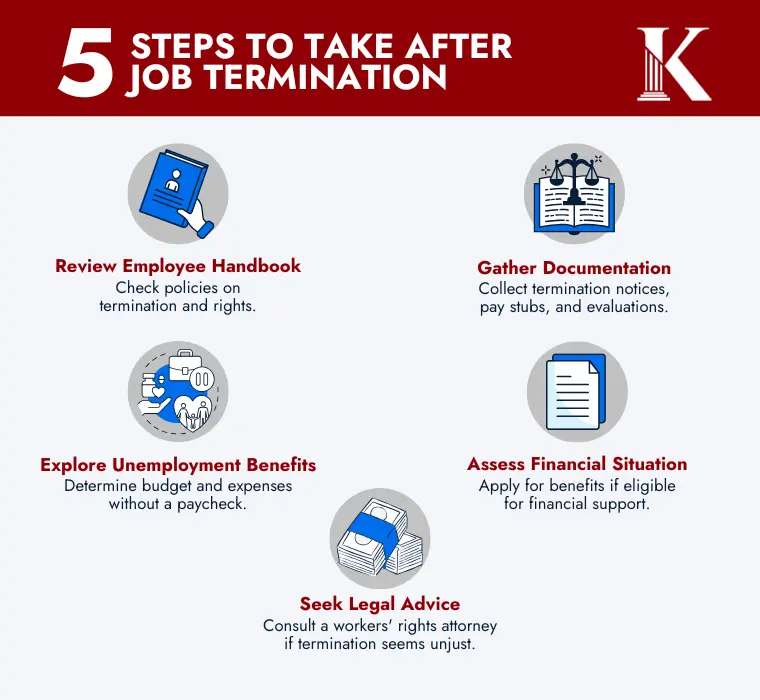In June alone, California saw over 450,000 separations, with layoffs and discharges making up a significant portion. For Fil-Ams, it’s essential to know the laws around job termination, especially with California’s at-will employment laws.
Whether you’ve signed an employment contract or faced an unexpected termination, knowing your legal rights can protect your future. This is particularly important for those managing challenges related to job search and even immigration status.
Paano nga ba tayo lalaban sa ganitong sitwasyon? Continue reading to explore your options and ensure you’re prepared to take the right steps moving forward.
Common Reasons for Job Termination in California

According to a 2021 Pew Research Center survey, Americans quit their jobs mainly because of low pay, limited growth opportunities, and feeling disrespected at work. These are examples of common factors that can lead to voluntary termination.
In addition to voluntary resignations, there are several common reasons for termination. Employers may let workers go due to poor performance, failure to meet job expectations, or business reasons such as company restructuring or downsizing. While these may be legitimate, it’s important to know that not all terminations are lawful.
Wrongful termination occurs when an employee is fired for illegal discriminatory or retaliatory reasons. Losing a job can feel like bad news, but understanding the reasons behind it is the first step in protecting your rights.
Your Legal Rights After Job Termination in California
Have you considered your legal rights after being let go? Let’s explore the protections available to ensure you’re treated fairly during and after termination.
In California, employment is generally at-will, meaning the employer or employee can end the relationship at any time without penalty. However, this doesn’t mean you lose all your rights when terminated.
Knowing what to expect regarding your final paycheck is essential if you receive a notice of termination. All wages due must be paid immediately upon termination, including any earned but unused vacation pay.
Health insurance coverage can continue through the Consolidated Omnibus Budget Reconciliation Act (COBRA), allowing you to maintain your plan for a limited time. Additionally, you may be eligible for unemployment benefits if you were let go through no fault of your own.

Experiencing job loss can be overwhelming, but taking the right steps can help you regain control of your situation. Here are five critical actions to consider following an involuntary termination:
- Review Your Employee Handbook: Look through your employee handbook for information on the termination process and your rights. This document often outlines company policies regarding job loss and any benefits you may be entitled to.
- Gather Documentation: Collect all relevant documents, such as your termination notice, pay stubs, and performance evaluations. This information can be vital if you decide to seek legal assistance or file for unemployment benefits.
- Assess Your Financial Situation: Review your finances to determine how long you can survive without a paycheck. Create a budget to manage your expenses during this transitional period.
- Explore Unemployment Benefits: If eligible, apply for unemployment benefits immediately. These benefits can provide temporary financial support while searching for a new job.
- Seek Legal Advice if Necessary: If you believe your termination was unjust or discriminatory, consider consulting a workers’ rights attorney. They can help you understand your options and guide you through potentially challenging the termination.
When to Consult a Workers Rights Attorney
Understanding your rights is essential after job termination, especially if you believe your situation may involve unfair treatment. Below are some key circumstances when consulting a workers’ rights attorney is advisable:
- Discrimination Issues: If you suspect your termination was based on factors such as race, gender, or sexual orientation, it may constitute discrimination. An attorney can help you evaluate whether you have a wrongful termination claim.
- Violation of Company Guidelines: If your termination did not follow the company guidelines or policies outlined in the employee handbook, an attorney can assess if the termination decision was unjust and guide your next steps.
- Unpaid Wages or Benefits: If you are owed unpaid wages, accrued vacation pay, or other benefits after your termination, a workers’ rights attorney can help you understand your rights and pursue financial assistance.
- Concerns About Immigration Status: If your immigration status played a role in your termination, seeking legal advice can clarify your rights and options. Regardless of your status, you have rights that need to be protected.
Reaching out to a knowledgeable attorney can provide crucial support for members of the Filipino community near you. This assistance ensures that you are treated fairly during this challenging time.
Assert Your Rights
Understanding your rights after job termination is vital for protecting yourself and dealing with labor laws. Consulting a workers’ rights attorney can make a difference if you experience unfair termination or need guidance on your next steps.
They can help you assess your situation and determine if you have a valid compensation claim. Members of the Filipino community near you can find valuable support in legal counsel to ensure they are treated fairly.
Remember, there are different types of termination, and knowing your rights can empower you in your job search. If you feel you’ve been wronged, contact us today to protect your rights.




